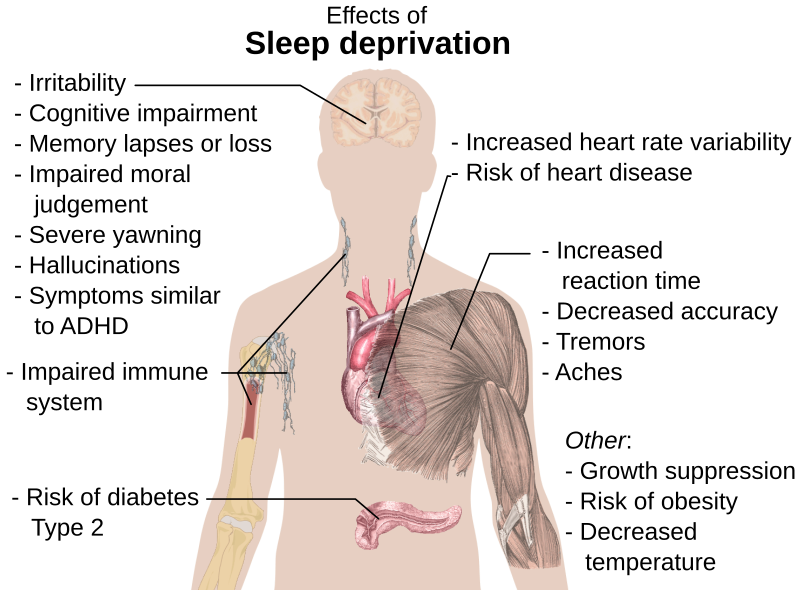6 Illustrated Guides To Different Types Of Meditation
Slumber deprivation is pretty mutual these days—it's a major attribute of accomplishment-oriented societies—but why would anyone accept a love-detest relationship with it? Usually, one would say,sleep deprivation and all the accompanying symptomsare the definition of a honey-hate human relationship, to the core.
Let me tell you something: y'all tin canuse slumber deprivation for your own benefit. We'll get into how this works, just first, let's talk over the phenomenon of sleep, sleep deprivation and its symptoms, and finally blueprint a "how to" experiment nigh sleep deprivation(commonly known equally self-torture), and enquire ourselves, more chiefly, why?
Slumber: Functionality
"Sleep is a naturally recurring state characterized past reduced or absent-minded consciousness, […] and inactivity of nearly all voluntary muscles." (Macmillan, 1981). This is a brusk and clear explanation:
- slumber is characterized by sleep stages/cycles (five cycles, differing in depth)
- the deeper your sleep, the better the quality of slumber
- More Sleep ≠ Ameliorate (healthy avg. 7.5-9 hours)
The functions of sleep are very multifaceted and majorly unexplored, but these (validated, and unremarkably accepted) aspects interest us the well-nigh right now. Sleep has a major impact:
- on our memory and the ability to re-organize thoughts, experiences and to acquire new things (neuroplasticity)
- on the regulation of necessary hormones and the ability of our body to regenerate physically
What is Slumber Deprivation?
Sleep deprivation is the lack of sleep: either it was caused by a very superficial and brusque sleep (over a menstruation of some days) or by no sleep at all. The functionality and benefits of sleep are limited as a outcome (come across above), and nosotros might face someserious issues, if nosotros stay slumber-deprived for a prolonged period of time.
The effects of slumber deprivation are diverse; some occur instantly afterwardsacute deprivation, other occur only afterwardchronic deprivation:

(by Mikael Häggström, Wikimedia Commons, 2009)
After astute deprivation:
- irritability
- cerebral impairment
- memory lapses
- restricted sentence
- severe yawning
- increased heart-rate variability, increased reaction time and decreased accuracy
- temporary emotional instability
After chronic impecuniousness:
The effects of chronic deprivation boil downwardly to the development of various diseases, such as:
- Diabetes
- heart disease
- growth suppression
- restricted immune system functionality
- weight gain/loss
- depression
Due to the variety of astute deficits, sleep deprivation has been used as a successful interrogation technique. In fact, the U.S. military authorised sleep deprivation as an interrogation method (Leave no Marks: Enhanced Interrogation Techniques and the Risk of Criminality, August 2007).
Simply hey, why would there be alove-hate relationship here? What's the benefit for us?!
How To (..and the benefits of sleep deprivation?!)
The effects of slumber impecuniousness on the human body were observed and analyzed in the 70s: the methodological monitoring involved blood analysis, but also neuropsychological instruments to capture the brain activity during sleep-deprivation and duringrecovery sleep subsequently deprivation.
The results:"There's show of antidepressive event after sleep deprivation."Equally a matter of fact, subjects experienced a37.2 % comeback in their mood!
The background of these results are various—the reasons behind the remarkable mood comeback are, amidst others:
- biochemical investigations proved an increase of unlike hormones, including serotonin and noradrenaline, which are likewise known to functionevery bit a happiness hormone (serotonin) and stimulating hormone (noradrenaline)
- improved sleep continuity and depth in the night after sleep deprivation
These mentioned furnishings take action in depressedbut likewise non-depressed people,meaning that you can stay awake for a night, begin the side by side day as you lot ordinarily do and attempt to proceed yourself awake (that's not very like shooting fish in a barrel!) and go to bed quite early → slumber similar a baby → wake upwards the side by side morning withmore power and free energy.
Past depriving yourself of sleep, youprepare your biological clock to null— in case your time management is messed up and running out of fuel, this can very helpful (a dearest-hate human relationship). You tin call sleep deprivationsleephacking: at outset we abstain from sleep, and later (during the recovery night) nosotros slip into a very deep state of slumber, which will regenerate us.
Admittedly, sleep deprivation amidst salubrious people is oft met with skepticism, mainly because healthy subjects can regulate their sleep pattern in other means (through diet, slumber hygiene and sleep rituals). On the other hand, sleep deprivation is free of whatsoever serious side effects and can serve as a quick ready. Here'south a brusque how-to:
- Perform your sleep deprivation "experiment" on the weekend (working in a sleep deprived state tin can exist difficult)
- Proceed yourself awake during your sleep deprivation nighttime (and the following twenty-four hour period) with the assist of tea or coffee, but please don't overdo information technology
- Go to bed early on your sleep-deprived day, and enjoy your deep recovery nighttime (7.five – 9 hours)
- Wake up powerful and energized, feeling similar a million dollars
After your sleep deprivation experiment you should accept care of a well-balanced diet and expert sleeping habits—exercise non regress to old, negative tendencies. Sleep deprivation for a night can be applied easily, is highly effective and complimentary of serious side effects. Have you already tried it? Share your experience with us!
Featured photo credit: Lux Graves via unsplash.com
Source: https://www.lifehack.org/articles/lifestyle/6-illustrated-guides-different-types-meditation.html
Post a Comment for "6 Illustrated Guides To Different Types Of Meditation"